[Newsbits] 5-6.03.2024: Chakshu, Right to Abortion, Gevra Mine & more
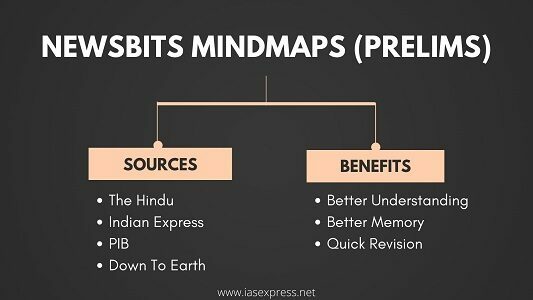
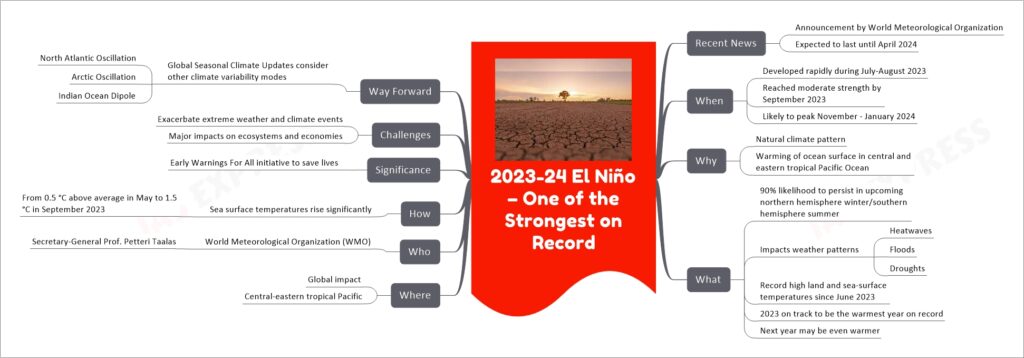
The World Meteorological Organization (WMO) has announced that the ongoing El Niño event, which started developing rapidly during July-August 2023 and reached moderate strength by September, is expected to be one of the strongest on record. This event is anticipated to last until at least April 2024 and is likely to fuel further increases in global temperatures. It has significant impacts on weather patterns, contributing to extreme weather events such as heatwaves, floods, and droughts across the globe. The rapid development and significant impact of this El Niño event are noteworthy against the backdrop of the climate being changed by human activities, with 2023 on track to be the warmest year on record due to the combined effects of El Niño and high concentrations of greenhouse gases.
This El Niño event underscores the importance of early warning systems and the need for global cooperation in monitoring and preparing for its impacts. It highlights the complex interplay between natural climate patterns and human-induced climate change, with significant implications for weather, ecosystems, and economies worldwide.

The recent amendment of FDI norms in India’s space sector marks a significant liberalization aimed at boosting growth and innovation. The new policy allows up to 100% FDI under the automatic route in various categories, promoting private sector participation and integrating Indian companies into global value chains. This move is expected to generate employment, enable technology absorption, and make the sector self-reliant. With the Indian Space Association welcoming these changes, the future looks promising for India’s space industry, potentially enhancing its share in the global space economy.

The Reserve Bank of India (RBI) has made a significant move towards internationalizing the Indian Rupee by allowing rupee payments for oil imports, particularly marking its first-ever rupee payment for crude oil purchased from the UAE. This step signals a potential shift in global trade transactions, traditionally dominated by the dollar, and is aimed at bolstering the booming trade between India and the UAE, with aspirations to surpass the $100 billion mark. The RBI’s initiative is part of a broader strategy, aligned with the BRICS’ objectives, to promote the rupee on a global scale and diversify oil suppliers to reduce transaction costs and dependency on the dollar. This move is supported by the establishment of Special Rupee Vostro Accounts for facilitating trade transactions and is seen as a step towards reducing foreign exchange costs, making the rupee a globally accepted mode of payment, and potentially positioning it as a hard currency. However, this initiative faces challenges, including concerns from suppliers about fund repatriation and transaction costs.
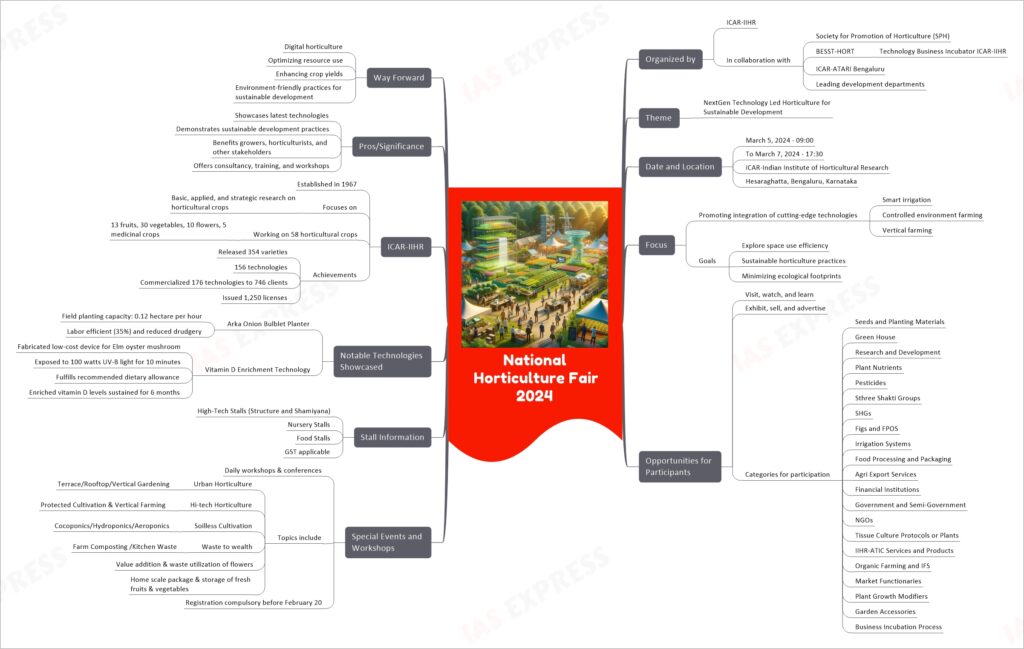
The National Horticulture Fair 2024, scheduled for March 5-7 in Bengaluru, Karnataka, is a significant event organized by the ICAR-IIHR. It focuses on showcasing next-generation technologies in horticulture aimed at sustainable development. The fair emphasizes the importance of integrating advanced technologies such as smart irrigation, controlled environment farming, and vertical farming into horticultural practices. It offers participants a unique opportunity to learn, exhibit, and engage with experts in various fields, including research and development, organic farming, and food processing. With a rich program that includes special workshops and the presentation of innovative technologies like the Arka Onion Bulblet Planter and Vitamin D Enrichment Technology, the fair aims to educate and inspire farmers, agripreneurs, students, and other stakeholders towards more efficient and sustainable agricultural practices.

The Gevra Mine, operated by South Eastern Coalfields Limited (SECL), a subsidiary of Coal India Limited (CIL), is on its way to becoming Asia’s largest coal mine. Recent efforts to ramp up its annual production from 50 million tonnes to 70 million tonnes aim to meet the growing energy needs and enhance India’s coal production capacity. This significant expansion involves a hefty investment, addressing environmental clearance, and developing first-mile connectivity to streamline coal transportation. With a focus on infrastructure development, including rail projects as part of the PM Gati Shakti national master plan, the project also faces challenges such as environmental concerns and protests over land acquisition. Nonetheless, the expansion of the Gevra Mine is significant for India’s coal industry, promising to bolster the country’s position in the Asian coal market while ensuring employment opportunities and meeting energy demands.
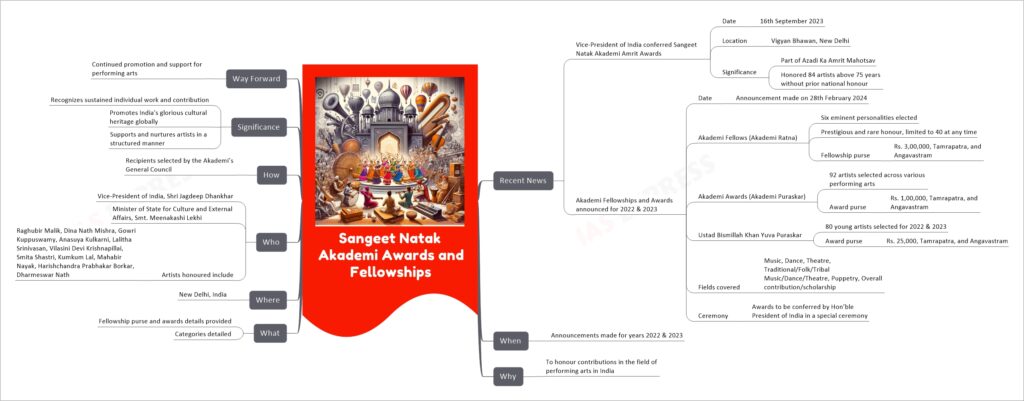
The Sangeet Natak Akademi Awards and Fellowships represent the highest form of recognition in the field of performing arts in India, including music, dance, and theatre. These accolades are awarded by the Sangeet Natak Akademi, India’s National Academy of Music, Dance, and Drama, which was set up in 1953. The awards aim to honor the exceptional contributions of artists to the cultural heritage of India. The Fellowships (Akademi Ratna) are conferred upon distinguished individuals for their lifetime achievements and are limited to 40 living recipients at any given time, while the Akademi Awards (Akademi Puraskar) recognize excellence in the performing arts. Additionally, the Ustad Bismillah Khan Yuva Puraskar is awarded to young artists to encourage their talent in the field of performing arts. These awards and fellowships not only celebrate the artists’ individual contributions but also aim to inspire future generations to preserve and promote India’s diverse cultural traditions.
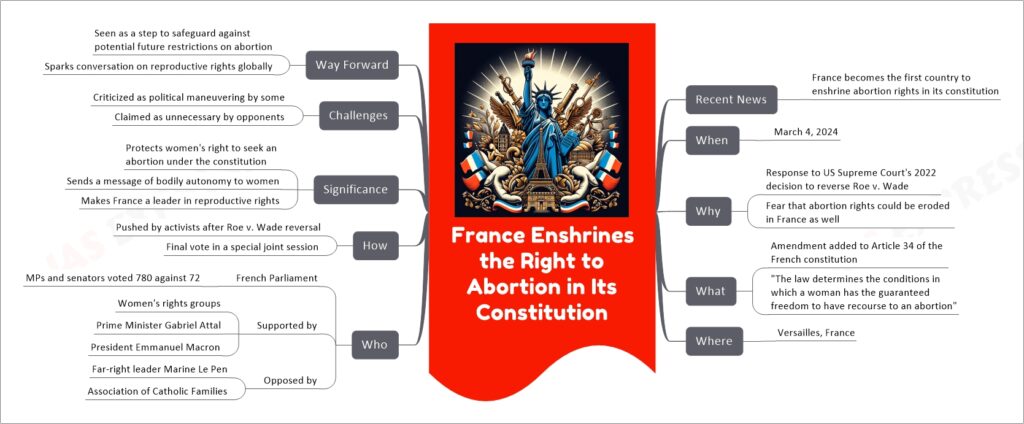
France has made history by becoming the first country in the world to constitutionally enshrine the right to abortion, following a decisive vote in Parliament. This landmark decision was influenced by the recent rollback of abortion rights in the United States and aims to safeguard women’s reproductive rights against future challenges. The amendment, added to Article 34 of the French Constitution, ensures women’s freedom to seek an abortion, a move broadly supported across the French political spectrum and by the public. While the decision has been celebrated by women’s rights groups and government officials as a monumental step towards protecting bodily autonomy and reproductive freedom, it has also faced criticism from conservative and anti-abortion groups. Nonetheless, this act solidifies France’s commitment to women’s rights, amidst a global landscape where such freedoms are increasingly under threat.
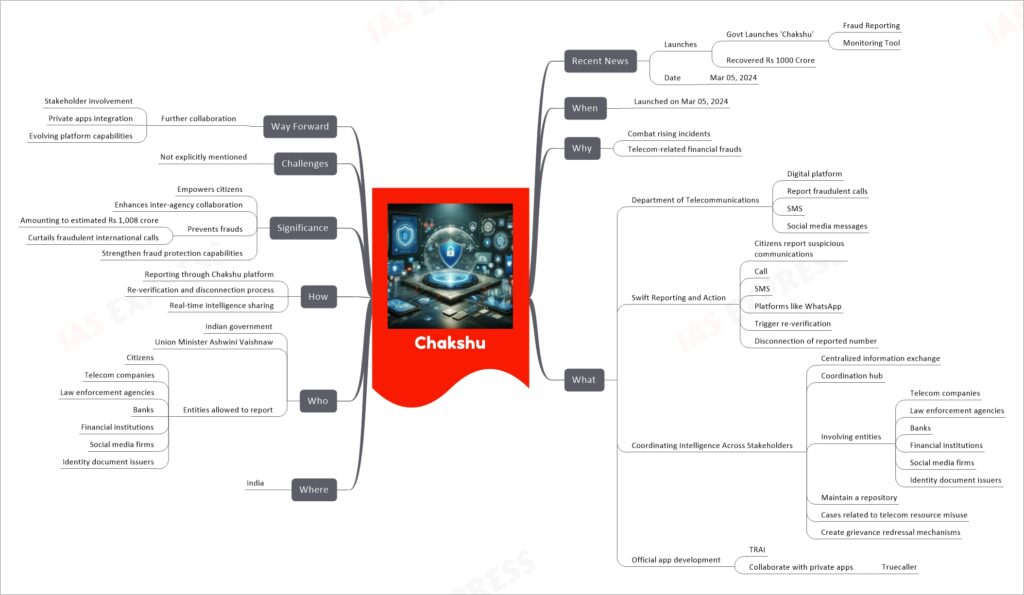
The Chakshu platform, launched by the Indian government, represents a significant step in combating telecom-related financial frauds, including fraudulent calls, SMS, and social media messages. It enables citizens and various stakeholders, such as telecom companies, law enforcement agencies, banks, financial institutions, and social media firms, to report suspicious communications. The platform, part of the Department of Telecommunications, offers a swift reporting and action mechanism, triggering re-verification and, if necessary, disconnection of the reported number. It aims to coordinate intelligence across different stakeholders, maintaining a repository of cases related to telecom resource misuse and creating grievance redressal mechanisms for inadvertent disruptions or monetary losses. Launched on March 5, 2024, Chakshu has already shown promise by preventing frauds amounting to an estimated Rs 1,008 crore and significantly reducing fraudulent international calls.
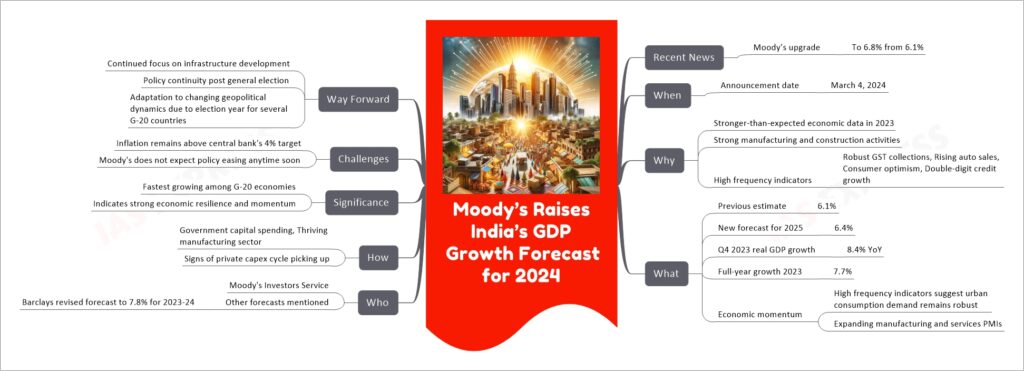
Moody’s Investors Service recently raised India’s GDP growth forecast for the year 2024 to 6.8% from an earlier estimate of 6.1%. This revision is attributed to stronger-than-expected economic performance in 2023, including significant growth in manufacturing and construction activities. India’s economy had shown an impressive growth rate of 8.4% year-over-year in the fourth quarter of 2023, leading to a full-year growth of 7.7%. Factors such as robust Goods and Services Tax collections, rising automobile sales, consumer optimism, and double-digit credit growth have contributed to this positive outlook. Despite the strong growth dynamics, Moody’s highlighted concerns over inflation, which remains above the Reserve Bank of India’s 4% target, suggesting that policy easing may not occur in the near future. Additionally, Moody’s projects that G20 economies will collectively grow by 2.4% in 2024, indicating that India’s growth rate is significantly higher than the average for G20 nations.

The RBI has sanctioned the development of an interoperable net banking payment system by the NPCI in collaboration with Bharat BillPay Ltd (NBBL). This system aims to facilitate quicker settlements and direct payments for merchants, potentially reducing the Merchant Discount Rate (MDR). By allowing for direct dealings between accounts through a new platform, it seeks to streamline the payment process, thereby enhancing efficiency and reducing costs for merchants.
If you like this post, please share your feedback in the comments section below so that we will upload more posts like this.
